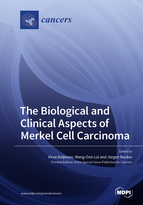The Biological and Clinical Aspects of Merkel Cell Carcinoma
A special issue of Cancers (ISSN 2072-6694). This special issue belongs to the section "Clinical Research of Cancer".
Deadline for manuscript submissions: closed (31 December 2020) | Viewed by 41728
Special Issue Editors
Interests: rare cancers; Merkel cell carcinoma; Merkel cell polyoma virus; surgery; complications; outcome; porocarcinoma
Interests: Merkel cell carcinoma, immune checkpoint molecules, immune evasion, microRNA, autophagy, Merkel cell polyomavirus, gene regulation
Special Issues, Collections and Topics in MDPI journals
2. Deutsches Krebsforschungszentrum (DKFZ), 69120 Heidelberg, Germany
Interests: skin cancers; Merkel cell carcinoma; immunology; tumor cell evolution; tumor cell plasticity; epigenetics; immunotherapy; therapy resistance; biomarker
Special Issues, Collections and Topics in MDPI journals
Special Issue Information
Dear Colleagues,
Eleven years ago, Professor Moore and his team discovered the Merkel cell polyomavirus (MCPyV) DNA integrated clonally into the tumor genome of most Merkel cell carcinomas (MCC). This finding enkindled both interest and, subsequently, research on this rare skin cancer and inspired many researchers investigating the molecular basis and clinical research on MCC. More recently, interest in MCC was further boosted by the observation that this highly aggressive cancer can be readily treated by an immune checkpoint blockade. Based on these research efforts, our understanding of MCC biology and immunology as well as its treatment has improved significantly. However, many questions in both basic and clinical research have yet to be answered, e.g., the cellular origin of MCC, the role of tumor microenvironment in MCC development and immune evasion, the clinical value of differentiating MCPyV-positive and -negative MCC, predictive biomarkers for therapy responsiveness, and salvage therapies for patients who progress under immunotherapy.
In this Special Issue, we will seek advanced knowledge in both basic and clinical research presented in original articles and comprehensive reviews highlighting the latest advances in MCC. We invite submissions that focus on but are not restricted to the molecular basis of the disease, translational investigations of biomarkers for prospective clinical applications, and innovative diagnostic and therapeutic approaches in MCC.
Dr. Virve Koljonen
Dr. Weng-Onn Lui
Prof. Dr. Jürgen C. Becker
Guest Editors
Manuscript Submission Information
Manuscripts should be submitted online at www.mdpi.com by registering and logging in to this website. Once you are registered, click here to go to the submission form. Manuscripts can be submitted until the deadline. All submissions that pass pre-check are peer-reviewed. Accepted papers will be published continuously in the journal (as soon as accepted) and will be listed together on the special issue website. Research articles, review articles as well as short communications are invited. For planned papers, a title and short abstract (about 100 words) can be sent to the Editorial Office for announcement on this website.
Submitted manuscripts should not have been published previously, nor be under consideration for publication elsewhere (except conference proceedings papers). All manuscripts are thoroughly refereed through a single-blind peer-review process. A guide for authors and other relevant information for submission of manuscripts is available on the Instructions for Authors page. Cancers is an international peer-reviewed open access semimonthly journal published by MDPI.
Please visit the Instructions for Authors page before submitting a manuscript. The Article Processing Charge (APC) for publication in this open access journal is 2900 CHF (Swiss Francs). Submitted papers should be well formatted and use good English. Authors may use MDPI's English editing service prior to publication or during author revisions.
Keywords
- Biomarker
- Carcinogenesis
- Diagnosis and prognosis
- Gene regulation
- Immunology and immune escape
- Merkel cell carcinoma
- Merkel cell polyomavirus
- Therapy
- Tumor microenvironment
- Viral oncoproteins and host factor interactions








